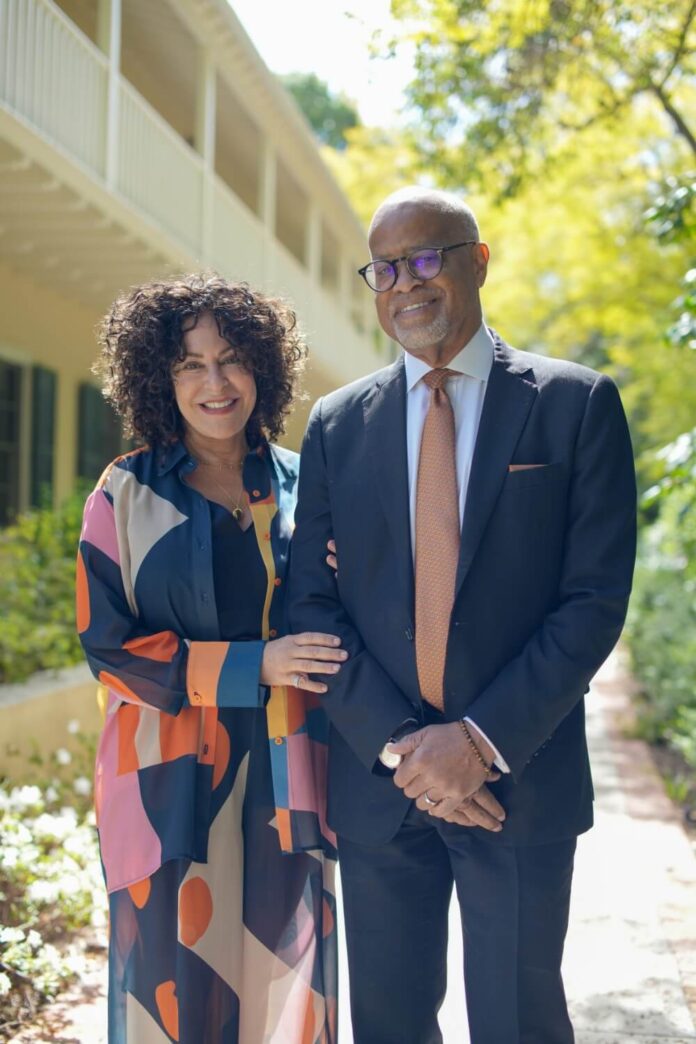
It is hard to imagine a day when President Harry J. Elam could walk around Occidental’s campus anonymously — on any given day, students can expect to snag his fist bump or catch a passing glimpse of his generous smile on the Academic Quad.
But in 2019, when he was getting vetted for his presidential role, that is exactly what Elam did.
To be fair, no one at Occidental really knew who Elam was at the time, particularly the student tour guide that led the mysterious man who asked too many questions for someone without a prospective student.
Just a few hours earlier, Michele Elam, William Robertson Coe Professor in the Humanities Department at Stanford University — just one of her many academic titles — and Harry Elam’s wife, did the same thing by herself. She was taking a peek at (and loving) her potential new backyard and tapped Harry Elam to do so as well.
“It was a beautiful day,” Harry Elam said. “People were on the Quad, sitting, relaxing, throwing Frisbee, you know, just the feel of it. I liked the fact that there’s this sort of uniform sense of design to the place, that it’s all of a piece. I really liked it from day one — it’s something in the place that I can be here and I want to be here.”
During that tour, Elam joined prospective students in the class of 2024. Now, he is leaving Occidental with them in June, after a diagnosis of Parkinson’s Disease, a neurodegenerative disorder, caused him to announce his resignation in August.
“I found out about the diagnosis and let that sink in. I can still do the job right now — I’m not that far along, but I may be sooner than later,” Elam said. “Stress is a major factor in the acceleration of the disease and if this job is anything, it’s stressful. And, Michele, my chief source of support has been commuting so she’s not here all the time, so all of that made me decide that way. Still, there are things that I would love to see completed. The campus climate and community and how we build that are things I care deeply about and would love to be involved with going forward.”
Michele Elam said the decision was and still is extremely hard to come to terms with.
“It’s excruciating and extremely hard for him, especially, and also for me to realize that in the interest of his health and well-being, but also the school’s to make that decision was really difficult,” Michele Elam said. “I think there’s a sadness and a sort of commitment to want to continue to support Occidental in all the ways that we can, depending on what that looks like.”
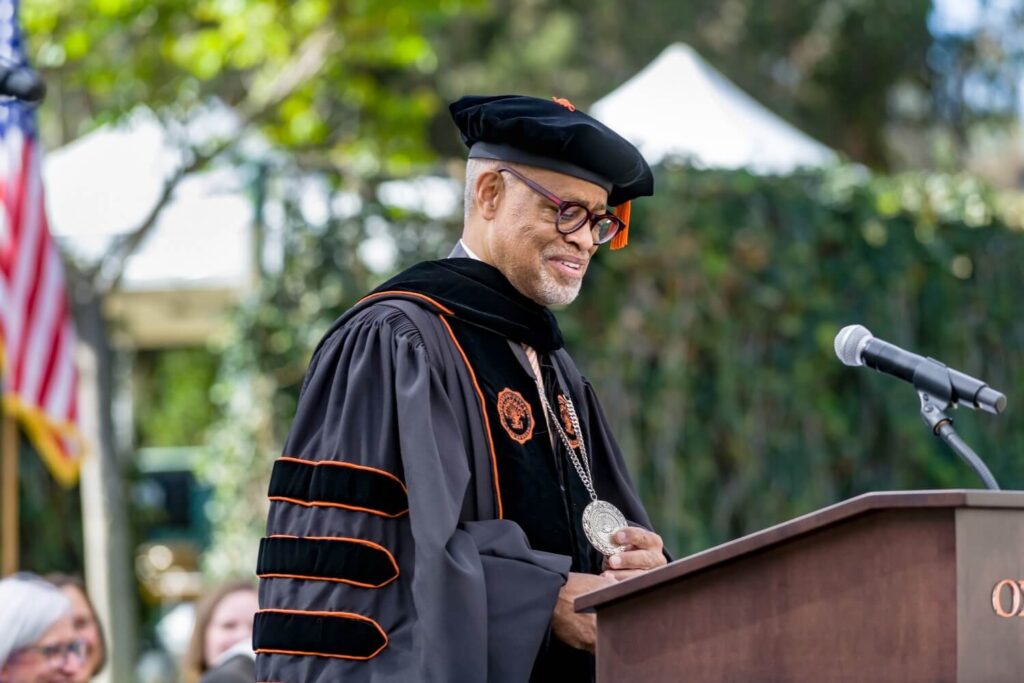
The alignment of time spent at the college with current seniors is not lost on Elam. He understands that he shares an unspoken bond with those students who, like him, joined Occidental shortly before a global pandemic halted nearly all academic operations.
“I am amazed that that class had to basically take a chance in terms of loyalty to an institution that [they] may not have seen that whole first year,” Elam said. “That, to me, makes [the] class pretty special and it makes me feel that connection.”
When Elam accepted the job offer in January 2020, it was a different time. Lisa Link, Chair of the Board of Trustees, the body responsible for hiring the college’s presidents, said that she and the presidential search committee met with Elam multiple times in person before reaching the unanimous decision to appoint him as president.
Link recalled one of her first impressions of Elam — it was during one of the later rounds of interviews, she said, and Elam met the Board in an intimate gathering at the Langham Hotel in Pasadena, rather than a strict business meeting.
“The way that he was able to command the attention of everyone in the room when he spoke, he was someone who you could tell was personable and someone that you would want to have a conversation with,” Link said.
Marsha Schnirring, former secretary of the college who was involved with Elam’s presidential hiring, said the biggest quality she remembers from one of her first impressions of Elam was his listening skills.
“Even though he’s a very accomplished person in the performing arts, he doesn’t dominate in the sense of taking all the air out of the room,” Schnirring said. “He really focuses on others, drawing them out, getting their opinion, their perspective on things. And he likes that wide range of input from a variety of people, which is really wonderful to witness.”
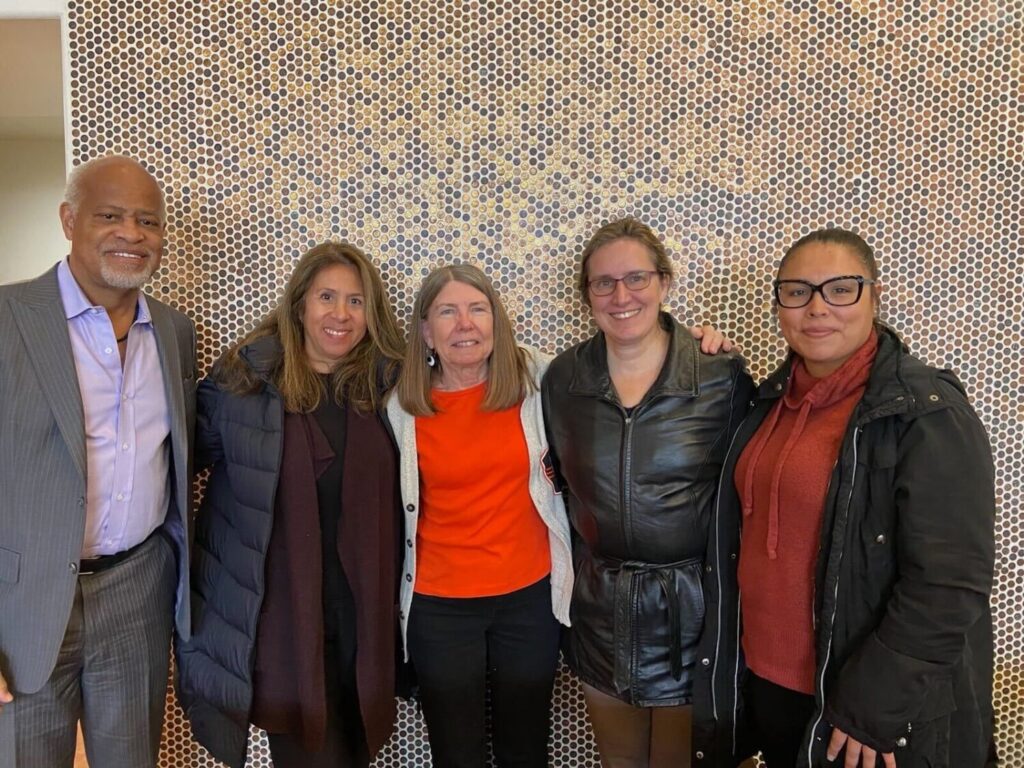
Elam officially became Occidental’s 16th president July 1, 2020. Exactly two weeks later, he announced to the entire Occidental community via email that the Fall 2020 semester would be completely remote, with limited exceptions for international students and others facing significant housing hardships. LA County shut down all in-person schooling Aug. 15, 2020.
The decision was a collective one made by the COVID Operations Group (COG), a team established in July 2020 that included Harry Elam, Dean of the College and Vice President for Academic Affairs Wendy Sternberg, Assistant Dean of Students for Emmons Wellness Center Devon Sakamoto, Vice President for ITS and Chief Information Officer James Uhrich, former Faculty Council president and sociology professor John Lang and Dr. Kimberly Schriner ‘80, who Elam called “Occidental’s Fauci.”
COG met every morning to discuss what the impacts of the pandemic meant for all aspects of the college including housing, curriculum and maintaining community, according to Elam.
“It’s interesting just how little we knew about the pandemic, COVID and what was necessary. We didn’t even have shots yet, so there were all sorts of questions that we were asking at that point and just didn’t know,” Elam said. “The weight of thinking of ‘What if I had students come back and something went wrong?’ became the number one priority.”
Around the same time, Elam said a cohort of college presidents in the LA area, including Claremont McKenna, Caltech and representatives of UCLA and USC, gathered to discuss and compare how they were handling the pandemic. Harry Elam said in total there are approximately 200 colleges in the LA area; although not all 200 college presidents were in attendance, some had also started their positions at the same time as Elam, identifying themselves as “pandemic-era presidents.”
“People came because everybody wanted to find out what everybody else was doing to share information and also commiserate, you know, because nobody expected that was what the job would be about,” Elam said.
His next challenge was connecting with a body of students, faculty and staff, the majority of whom he had never met in person. Schnirring said that Elam wasted no time in coordinating Zoom meetings for both students and faculty to connect with him and maintain a sense of community during the remote school year.
“He was a model of ‘Okay, this is what’s happening so this is how we’re going to stay connected,’’’ Schnirring said. “He put an unbelievable amount of time into meeting with all different kinds of constituencies during that time period, in addition to just the regular role that he had, you know, administratively.”
Before Zander Patent (senior) became president of the Associated Students of Occidental College (ASOC) in Fall 2023, he was a first-year member of the college’s football team attending Occidental on Zoom in 2020. Within Patent’s first three months at Occidental, Elam officially ended the college’s football program after years of deliberation under Occidental’s 15th president Jonathan Veitch.
Patent said Elam made himself available via Zoom to any member of the football team who was interested in hearing about the decision.
“I was pretty blown away by most of all his empathy and his willingness to listen and put himself out there and get criticism,” Patent said.
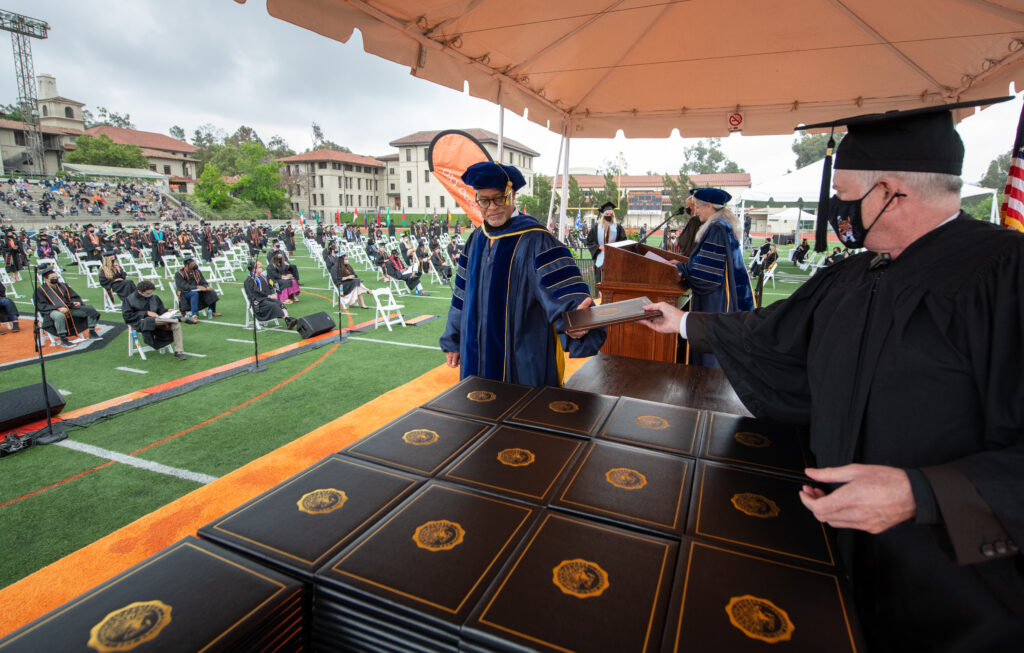
The Elams spent the 2020-2021 school year in the on-campus Wallis Annenberg President’s House. In 2017, Veitch moved off campus leaving the house vacant for nearly three years and ripe for renovation. Michele Elam said the refurbishment allowed for a personalized redecoration of the home.
“We could see when we entered that we wanted to entertain the students in the backyard and we changed the whole downstairs so that it was public-facing,” Michele Elam said. “We live upstairs and kept the downstairs so we could host events with students.”
But, before they knew it, the Elams hosted more wildlife than students in their first year living on campus. As a result of the Sept. 2020 Bobcat Fire, about 20 coyotes made their way to the safe haven of Annenberg House, Michele Elam said. Even hundreds of Occidental’s trademark crows found a home in the house’s surrounding eucalyptus branches.
Michele Elam spent the school year teaching at Stanford remotely and said that while she greatly appreciated being with Elam in their new home, she was yearning to be surrounded by students.
“There’s something especially poignant and sad about a place that’s supposed to be full of student life that isn’t […] I remember we didn’t know how noisy students would be because Annenberg [House] is right embedded in that, and we told ourselves, ‘When the students come back, even if they have late parties, we won’t care’ and we meant it. But y’all are so quiet! We didn’t hear any loud partying, which makes me suspicious,” Michele Elam said with a laugh.
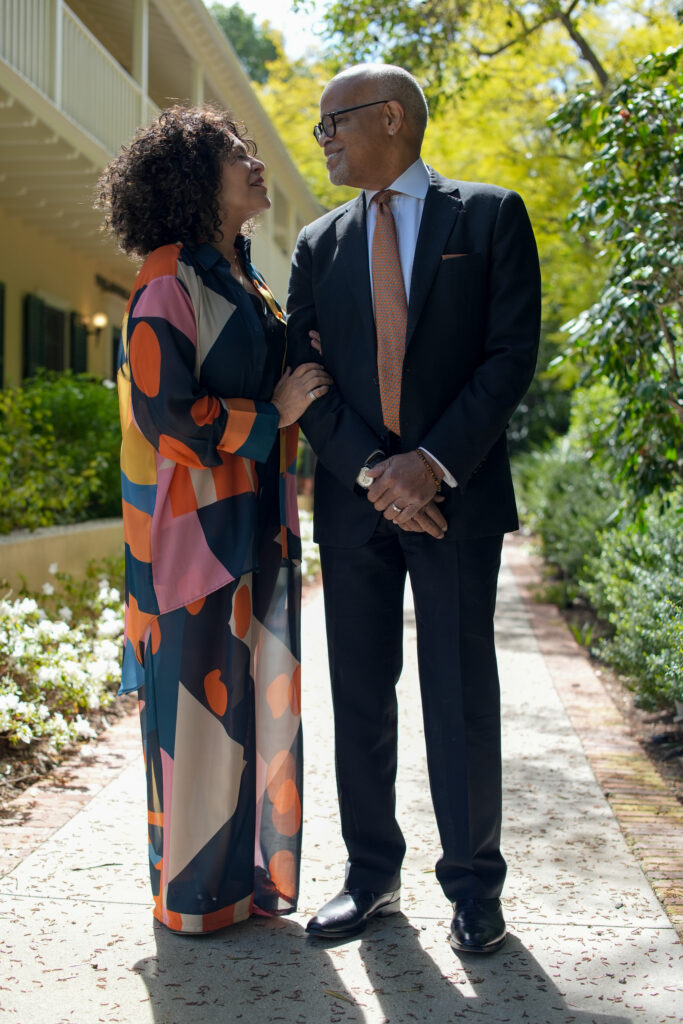
Michele Elam was just as eager for students to move back to campus as her husband, and when they did, she wanted to start a pet therapy for students with their two cats, Oswald and Leland, as in Occidental’s Oswald and Stanford University’s founder Leland Stanford.
The Elams attempted one pet therapy session in March 2022, but soon realized that their “COVID cats,” as Michele Elam called them, were so overwhelmed by the 50 eager students that she stopped the program.
“It freaked them out so much [the cats] needed therapy after,” Michele Elam joked. “But, that was the aim — we could see it was a school where we could both really engage with students.”
Patent said Elam engages with students in a way that is unique to someone in a position of power. Visibility is important, Patent said, and seeing Elam on campus frequently made him feel like he knew him even before he became ASOC president.
“The way he approaches students is really unique and positive in the sense that he goes up and asks good questions and asks people about their lives,” Patent said. “I think when he does that, it helps with transparency and improving that relationship.”
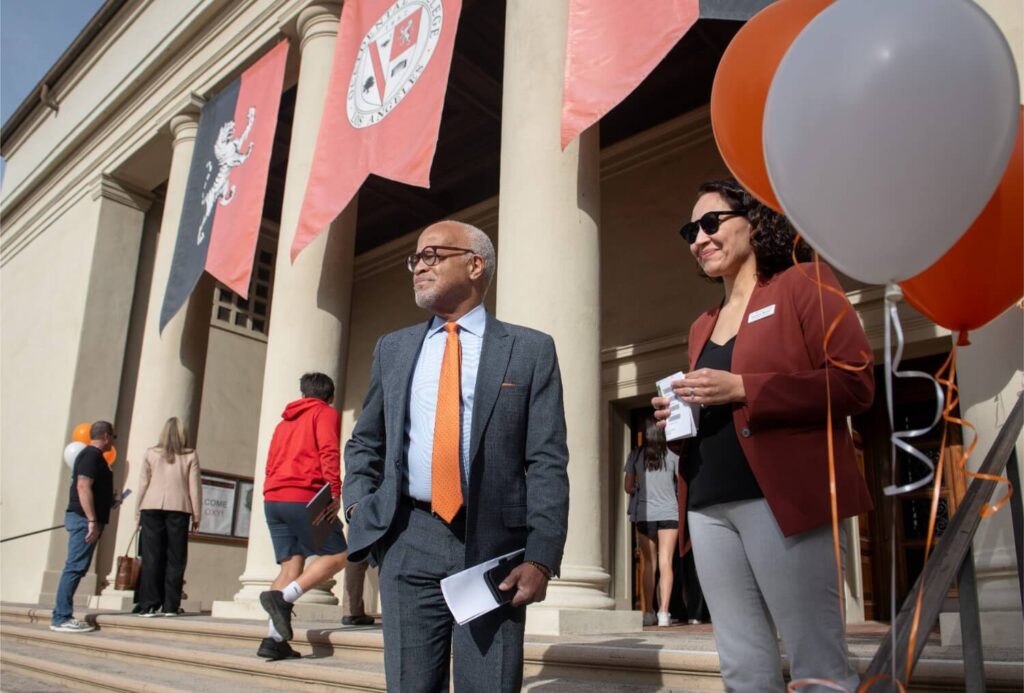
Dean of Students Rob Flot said that along with Elam being the first Black president he has worked for in his 30-year career in higher education, Elam is also the most student-involved. On any campus, Flot said, a president’s role is traveling and fundraising on behalf of the college. While Elam fulfilled that job description, Flot said he also prioritized the students and their college experiences immediately.
“He’s a very student-centered, student-driven president,” Flot said. “The other presidents I worked with weren’t not that, but he just makes the time for it, whereas in other cases, that wasn’t always the circumstance.”
Flot said that his job is more centered around student relationships at the college, but Elam incorporated many of Flot’s tasks into his agenda.
“I’ll tell him, ‘Harry, I can do that,’ but he says, ‘I know, but I want to meet with students,’” Flot said. “So, his devotion to meeting with students has been noteworthy.”
Patent said that as ASOC president, he meets with Elam monthly as a formality to check in with student affairs, but gained an appreciation for Elam’s willingness to take his ideas in stride.
“You can come to him with all these different things you want to change about the school and he’ll be like, ‘That’s a good idea, let’s do it,'” Patent said.
Elam knew from the jump that he would be that kind of president, he said, and Occidental students did not shy away from testing his involvement on campus. When he was selected for his presidential role, he asked students on the presidential hiring committee what they liked most about Occidental and they answered in that moment and in years to come — the activism.
“A student [on the search committee] came to me smiling after I was selected and he was like, ‘We really like you, but if you mess up, we’re going to picket you,’ and that’s what happened,” Elam said. “To me, that’s part of the experience for all of us of college and learning.”
Since students’ arrival on campus in Aug. 2021, students walked out of classes calling for more institutional action against sexual assault, two students’ anti-Asian text messages were leaked in Spring 2022 and, most recently, the Students for Justice in Palestine (SJP) led a multi-day occupation at the Arthur G. Coons Administrative Building.
As a son of the first Black chief justice of the Boston Municipal Court and a community activist librarian, Elam grew up surrounded by swirling values of equity and justice.
But, being a college president is different, he said.
There’s prioritizing equity and justice — then, there’s being an objective and supportive beacon of trust. Elam said his presidential role forced him to balance the values he inherited from his family with the opportunity to hold open discussions between all members of campus.
“The first fundamental thing is that I’m not simply representing my view and idea but speaking for the college, the need to think about all the members of the college and things that, if I was just acting on my own, I as president determined that I wouldn’t do or couldn’t do,” Elam said. “I learned from [my family] that the way you [achieve equity] or how you do it has to be strategic.”

Committing to equity initiatives at an institution like Occidental has to come from both the ground-up, meaning students and faculty, and the top-down, as in senior administration, Flot said.
“The president, at the end of the day, makes the decision when it comes to hiring and prioritization and so forth, so it needs to come from the president,” Flot said. “If it doesn’t come from there, even if it comes from the bottom up, it’s not going to make a big difference, but Harry has made that a priority during his time here.”
Patent said that he’s noticed a shift in the administration’s receptivity to student voices since starting at Occidental.
“From [the administration] as a whole, it seems like the culture has shifted to be more receptive to student feedback,” Patent said. “I think they have gone a long way from where it was in just listening and approaching feedback in a certain way that was not the case my freshman year.”
Elam said that with his experience collaborating with students before, during and after protests, he would encourage an Occidental course specifically tailored to the campus on how to achieve institutional change with senior staff members.
“What I also learned was a much better sense of humility through the years when [the student] said that because I knew or thought that no one would picket me or they wouldn’t take over the building when I was here because you know I’m gonna reach out to students, I’m gonna be there in ways — but obviously that was not the case,” Elam said.
Elam said that the Oct. 7 Hamas attack in Israel fractured the campus culture, which saw faculty members write letters regarding the Israel-Palestine war and a four-day occupation of the AGC to demand, among other things, that the administration advocate for a ceasefire in Gaza.
Similar to the pandemic, Elam said after Oct. 7, he and other college presidents met to discuss how the Israel-Palestine war was playing out on their campuses. They all found that letter writing was becoming a significant requirement of the presidential job, Elam said.
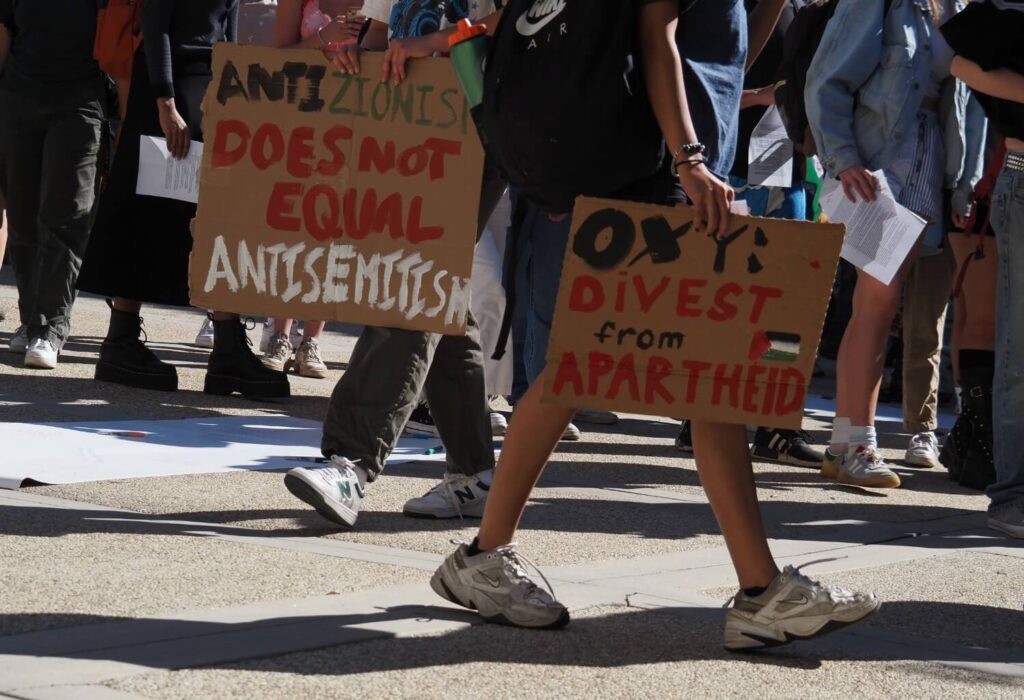
Elam’s emails sent to the entire campus community following Oct. 7 were characterized by Elam respecting all sides, maintaining objectivity, but being assertive about Occidental’s culture of care, a college philosophy stressed at perhaps no greater time than Elam’s last four years.
Patent said Elam’s focus on that culture has had a significant impact on his college experience.
“I think people do have each others’ backs at the end of the day, and I think a lot of his messaging resonates with me,” Patent said. “Even if he’s not talking to every single student all the time, he’s definitely aware of promoting that culture.”
Elam said he is still currently trying to mend any trust that was broken last semester as a result of Oct. 7 and Occidental’s fifth occupation in school history, but his mind wanders into the what-ifs. One of his biggest lessons learned at Occidental? To not take anything, especially criticism, personally.
“People are not personally picketing me or wanting to get rid of Harry Elam. I’ve seen that happen, but that’s more so the issues that they cared vehemently about and we’re taking action on that. I do think potentially in some of the instances, the action could have been different, you know, and so it makes me view the choices I made thinking about how I can be a better president or a better leader at those incredibly emotionally rash times and to make decisions that will be as effective as possible,” Elam said. “Hindsight’s always 20/20, but I mean you’ve got to build and learn from mistakes.”
Elam is not bitter or regretful about his last year at Occidental being one of his toughest, even after commandeering a college through a global pandemic; rather, he is enthralled by the challenge.
“While it was a bookend in some ways to the pandemic, all that happened after Oct. 7, I know I’m not defined by that,” Elam said. “That the college, through all of this, has shown resilience — I’m excited by that.”
Elam, to many of his colleagues, is rather defined by what he will leave behind, including the more than $250 million he raised for the Oxy Campaign for Good. Veitch started the campaign in May 2019 to raise $225 million for financial aid packages and academic and co-curricular programs. June 30, 2023, Elam sealed that deal with a bedazzled $252 million sticker.
Veitch said witnessing Elam’s achievement was a profound moment, especially after the pandemic threw a wrench in the projected trajectory of the fundraising.
“A good portion of that went for scholarship support, which allows the college to support more families that wouldn’t otherwise be able to afford an education,” Veitch said. “I think that all was fantastic and my hat is off to him because that is not easy, raising money.”
Elam also started new traditions, Flot said, including Moonlight Breakfasts, which started in 2022. The late-night meal is a campus-wide picnic, where the Marketplace’s signature scrambled eggs, muffins and veggie sausages fuel students before they head into final exams. The breakfast was completely Elam’s idea, according to Flot, and the Student Leadership, Involvement and Community Engagement Office made it happen.
“It’s becoming a nice tradition that we’ve had and Harry shows up for it and I’m like, ‘How does this man have the energy to do this?’ and walks down the line and talks to people — ‘How are you? What’s your major?’ Where are you from? What year are you?’ — all the things,” Flot said. “Things like that have, I think, really made a difference in terms of student experience.”
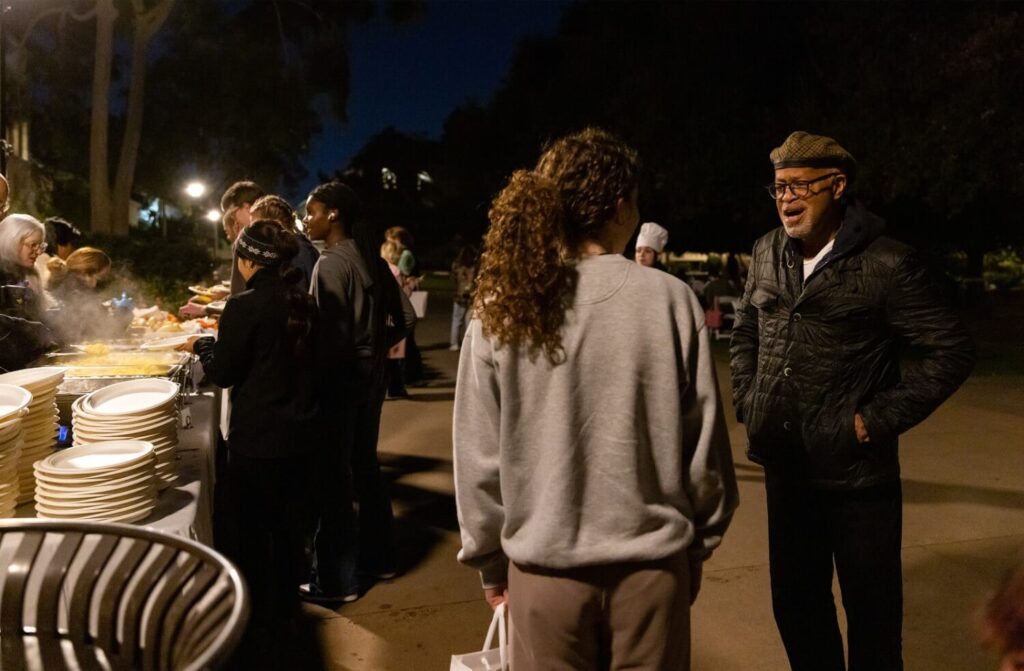
Sternberg said that Elam’s departure comes amid a new era — the college is finally coming out of the pandemic and The Occidental Promise, a new strategic plan, is gearing up to be implemented in the Fall.
“Typically, presidential turnovers happen at the end of something. In many ways, President Elam’s tenure was still at its beginning because it got off to a slow start during the pandemic,” Sternberg said. “I mean, he was only inaugurated [in April 2022]. When he announced he was leaving, it would be like 15 months since he was inaugurated when he had to make his announcement. So he was really just getting started.”
Flot called Elam a unifier.
“He’s done things that are going to last in four years and, as a president, that’s not very long to leave a lasting impression,” Flot said. “And I think the president is leaving a lasting impression.”
But, Elam isn’t leaving without ensuring what he started will remain. Plus, he still has three months to go. His office announced March 18 the New Harmonies Student Organization Grants program, which will provide funding of up to $5,000 to collaborative projects between at least two student organizations that represent differing viewpoints on campus.
Elam said that given the present tensions on Occidental’s campus, as well as around the country, he felt it was imperative to implement the program before he left. He is also intent on retaining students and faculty while he still can.
“I’m at a better place in terms of understanding,” Elam said. “You know, I would like to go on and see some of these things through with you, but as someone said to me, you could be here 22 years and you’d still want to go on and do things and that probably is true.”
As a former Occidental president for 11 years, Veitch said that the college president’s role is maintaining an institution’s integrity.
“There are certain things that are in the DNA of the college. College and university presidents can steer institutions a few degrees to the left or right, not politically, but what’s in the DNA of the college is where its future lies,” Veitch said. “So, there’s a certain humility in recognizing that on the other hand, these are institutions that are vital to so much about our society and good stewardship matters enormously, and Harry has been an excellent steward for the college.”
While there may be an embedded DNA within Occidental, it is clear that Occidental has seeped into the Elams’.
For Michele Elam, the couple’s move back to the Bay Area is bittersweet, especially as her commuting schedule over the past four years has limited her ability to be present in LA. She said, tearfully, that it feels as though just as both she and Elam found a rhythm at Occidental, they are packing up to leave.
“This is my thought about that: Oxy sort of took hold of our hearts, really and truly, and I feel like we will always consider it family,” Michele Elam said. “And when we come back, we’ll just show up — we’ll show up at games or graduations and things. I think, for both of us, those social rituals of ceremonies and graduations and honoring students and being present for those things really matters. So, hopefully we’ll find some way to have a meaningful afterlife at Oxy. It really had a profound impact on both of us, I know.”
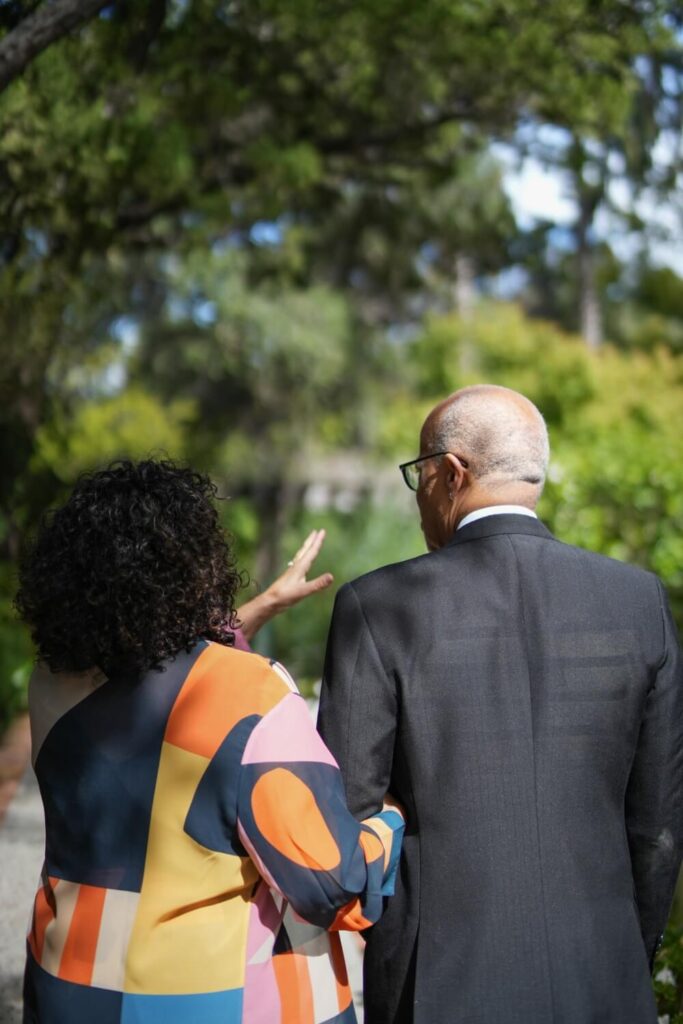
Despite the initial intent on having a much longer tenure at Occidental, President Elam said that four years was more than enough time to catch an Oxy bug.
“It’s been a journey, and I think that’s one of the things I share with the Class of 2024 — a journey of unexpected things in college experiences,” Elam said. “I’m not a fatalist, but I’m someone who believes that things happen for a reason. I’m not saying those reasons aren’t clear, but I’m glad that I was here at this time and this place and in no other situations than the ones we had.”
Back at the Annenberg House, a man and his wife live amid a glorious perimeter of fragrant eucalyptus trees and trimmed bushes. The coyote den is no more, and the reflective disks delicately placed in the branches to ward off crows now sway in the California breeze.
It’s a beautiful spring day, prompting the mysterious man without a prospective student to recall his first campus visit at Occidental. On the steps of their house, the man and his wife pose for a photo, naturally assuming a power couple pose — hands held, backs straight, mid-laugh smile with a slightly bent neck.
Just as the click of the camera sounds, the woman breaks character.
“You did it,” she said.
“What?” he said.
Without pause, she replied, “All of it.”
Contact Mia Anzalone at anzalonem@oxy.edu
This article was updated March 27 at 10:48 p.m. to reflect that the 2019 presidential search committee met with Elam multiple times before reaching a unanimous decision, not the Board of Trustees.
![]()



































